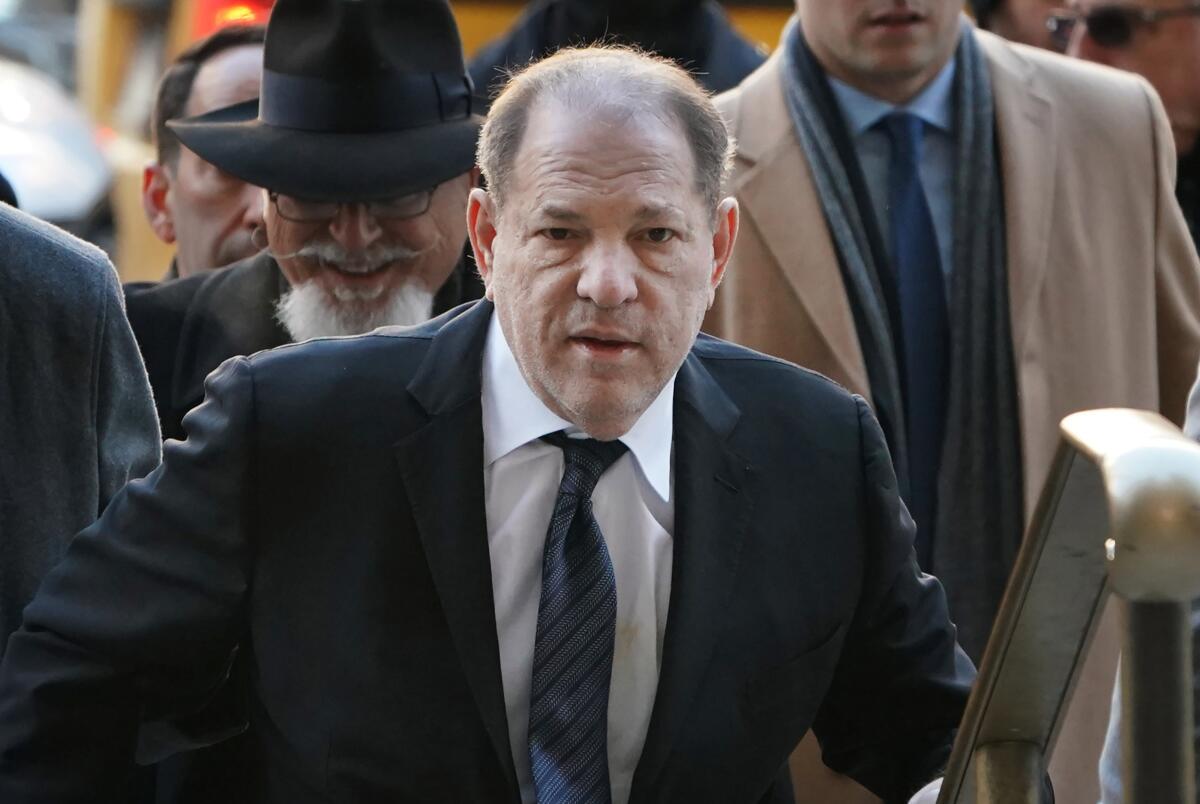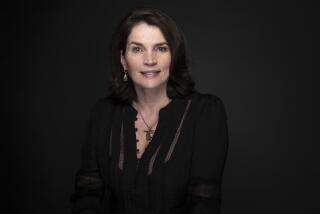Five things that have changed in Hollywood since the Weinstein case broke

- Share via
Once known for Oscar winners like “Shakespeare in Love,” disgraced producer Harvey Weinstein’s most lasting legacy will surely be the rise of the #MeToo movement triggered by his downfall.
On Monday, a New York jury convicted Weinstein of two of five counts. Weinstein was found guilty of one count of rape and one count of committing a criminal sexual act, with each crime connected to an individual allegation made by Mimi Haley or Jessica Mann. He was acquitted on the more serious charges of predatory sexual assault, which each carried a potential life sentence.
More than two years after accusations of sexual harassment and assault ended Weinstein’s career as a movie mogul, the ripple effects of the revelations continue in casting meetings, executive suites and writers rooms. Weinstein, who also faces charges in Los Angeles, denied all allegations of nonconsensual sex.
The #MeToo movement, launched by Tarana Burke years before it became a rallying cry of hashtag activism, has ended or stalled the careers of powerful men, including actor Kevin Spacey, former CBS chief Leslie Moonves, TV host Charlie Rose, producer Brett Ratner and comedian Louis C.K. Industry organizations, including trade guilds, the Academy of Motion Picture Arts and Sciences and talent agencies have taken some tangible steps to address the dangers and discrimination women face in Hollywood. Groups like Time’s Up have emerged to transform the energy of #MeToo into practical solutions.
Structural problems, such as Hollywood’s persistent lack of women in positions of power and key creative roles, will take years to adequately address. Still, on top of the specific changes to industry practices, advocates say there’s a strong sense that the underlying standards of behavior toward women in the industry have changed in significant ways, despite rumblings of backlash from people (mostly men) who say the movement has gone too far.
“The bottom line is, the tectonic plates of the industry have shifted completely,” said Melissa Silverstein, publisher of Women and Hollywood. “There is always going to be this understanding that egregious things have happened across multiple parts of this industry and people can see that.”
Here’s what’s changed.
New guidelines
The Weinstein allegations sparked much-needed reforms within Hollywood guilds and agencies — institutions that are supposed to protect their members and clients from being taken advantage of, but instead were criticized for not doing enough to prevent abuse.
Over the last two years, unions and agencies have taken steps to curb practices that make women vulnerable to sexual harassment. Performers union SAG-AFTRA in 2018 called on producers and executives to refrain from requesting meetings in “high-risk locations” such as private homes and hotel rooms as part of a seven-page code of conduct. Talent representatives have increasingly cautioned clients against taking meetings in such places.
The changes continued this year when SAG-AFTRA released a four-page guide on the use of intimacy coordinators to prevent abuse while filming nude and simulated sex scenes. The use of such specialists has become more common, with HBO in 2018 announcing it would hire intimacy coordinators to monitor sets of its programs.
“These guidelines didn’t exist before, so they’re incredibly meaningful,” Silverstein said. “I think what we need to understand is that every little piece counts.”
The Academy of Motion Picture Arts and Sciences instituted new standards of conduct for its members and ejected Weinstein, Bill Cosby and Roman Polanski from its ranks.
Studios, meanwhile, have become more cautious when hiring directors and actors who may have a history of offenses. Distributors and streaming services have increasingly placed “morality clauses” in contracts that allow them to pull out of projects if people involved are exposed for wrongdoing. Those clauses can be very broad, said Akin Gump entertainment lawyer Vanessa Foltyn Roman. “The first drafts we’re seeing could cover everyone from the lead actor to the makeup artists,” she said.
Legal changes
The allegations against Weinstein have not only changed our society, but also the law.
Last year, the National Women’s Law Center published a report noting that since 2017, 15 states have passed new laws protecting employees from sexual harassment and gender discrimination, including banning or placing limits on the use of nondisclosure agreements and extending the statute of limitations for victims seeking to file civil lawsuits against their abusers.
“This culture of secrecy and protecting harassers and marginalizing women once they’ve complained is much harder now,” said Nancy Erika Smith, a partner at the Montclair, N.J., law firm Smith Mullin, who has represented former Fox News anchor Gretchen Carlson and Weinstein accuser Rowena Chiu.
California was among the first states to restrict the use of NDAs when outgoing Gov. Jerry Brown signed a bill that went into effect last year prohibiting nondisclosure provisions in settlements involving claims of sexual assault, harassment or discrimination based on sex. Advocates have held that NDAs, routinely used in settlement agreements, helped enable predators continue to abuse and harass women.
Weinstein, Cosby and former Fox News personality Bill O’Reilly used NDAs when settling claims of sexual misconduct.
A number of states have expanded statutes of limitations for sex crimes. California passed legislation in 2018 giving victims of sexual violence 10 years instead of two to file a civil action against their abusers. Last year, both California and New York passed laws, allowing even more time for victims of child sexual abuse to file civil lawsuits against their assailants.
Advocates and legal experts point to the fact that Weinstein stood trial in Manhattan for multiple sexual assault charges (he also faces four counts of rape and sexual battery in Los Angeles) as an important shift.
Calling his prosecution, a “sea change,” Debra Katz, a partner at law firm Katz, Marshall & Banks, said: “This is a direct reflection of societal changes since #MeToo took place. The New York D.A. chose to bring this case and charge Mr. Weinstein with the most serious of felonies. As a result of this societal reckoning, we are bringing people to account when they assault women.”
In Hollywood, where actresses are often at the mercy of the male-dominated power structure for their next job, it’s no longer business as usual.
“I think this notion that you can simply invoke the casting couch culture as an excuse for rape, those days are over,” said Katz.
Corporate upheaval
Allegations of harassment and other sexual misbehavior brought corporate upheaval at multiple major media companies, which became increasingly intolerant of questionable workplace behavior after Weinstein’s implosion.
“Frozen” co-director Jennifer Lee was named chief creative officer of Walt Disney Animation Studios after the ouster of John Lasseter, who lost his job after he acknowledged “missteps” in his treatment of employees. Amazon in 2018 brought in Jennifer Salke to run its entertainment studio, replacing Roy Price, who left due to sexual harassment allegations. Ann Sarnoff last year became the first female CEO of the Warner Bros. film and TV studio, replacing Kevin Tsujihara, who was pushed out following a sex scandal.
Putting women in positions of power is key to real change in the entertainment industry and beyond, Smith said.
“There have been changes, but nothing has changed until women share power, and I mean everywhere, in Hollywood and every other industry,” Smith said. “If they remain male-dominated, men will continue to harass, abuse and retaliate against women.”
Some men have begun to wage comebacks. Lasseter last year joined David Ellison’s Skydance Media as head of its growing animation division. Weeks after Moonves’ ouster from CBS, the embattled executive started a new company based in West Hollywood called Moon Rise Unlimited.
Social activism
The hashtag #MeToo became more than a rallying cry; it launched a social movement, leading to the formation of several organizations to address sexual abuse and harassment in the entertainment industry. Outside of raising awareness, measurable successes have been mixed.
In 2017, a group of powerful entertainment figures launched the Hollywood Commission for Eliminating Sexual Harassment and Advancing Equality launched. Led by Anita Hill, who ignited sexual harassment awareness during the 1991 Senate confirmation hearings of Supreme Court Justice Clarence Thomas, its mission is to “tackle the broad culture of abuse and power disparity.”
The commission, backed by Lucasfilm President Kathleen Kennedy among others, has partnered with several major Hollywood organizations including Amazon, Netflix, Paramount and ICM. Last year, it initiated a survey to evaluate workplace culture within the entertainment industry.
Vowing to fight discrimination and sexual harassment and give voice and support to victims, 300 women came together in January 2018 to found Times Up. They took out “Dear Sister” newspaper ads and enlisted A-list actresses to dress in black at the Golden Globe Awards, where Oprah Winfrey used her speech to slam “a culture broken by brutally powerful men.”
The group says it has raised over $22 million for a legal fund to assist women. But its mission, efforts and internal dynamics have fallen short of its stated goals. Last February, Lisa Borders, former president of the Women’s National Basketball Assn., resigned as Time’s Up president and chief executive after sexual misconduct allegations were levied against her son.
Still, activists have kept these issues in the public eye.
“What I do see is a consciousness that hadn’t been there before and community building, particularly among women,” said producer and former studio executive Amy Baer, board president of Women in Film. “There’s a lack of trepidation about speaking up and speaking out for people with powerful voices like actresses and prominent filmmakers, and that’s been an amazing thing.”
Representation
The #MeToo movement resulted in a broader focus on female representation in Hollywood, especially the lack of opportunities for women in the director’s chair and in top executive roles. For the second year in a row, no women were nominated in the directing category at the Oscars, despite numerous acclaimed female-helmed movies, including Greta Gerwig’s “Little Women” and Lulu Wang’s “The Farewell.”
Though disparities remain, studios are slowly beginning to hire more female filmmakers. A January study by USC’s Annenberg Inclusion Initiative found that 10.6% of the directors of last year’s 100 highest-grossing movies were women, up from 4.5% in 2018. In television, according to the Directors Guild of America, 31% of episodes during the 2018-19 season were directed by women, compared with 25% in the prior year.
The 2020 film schedule includes a handful of female-directed big-budget franchise films. Both of this year’s Marvel Studios films are directed by women: The long-awaited “Black Widow,” from Cate Shortland, and “The Eternals,” led by Chloé Zhao. Patty Jenkins is returning for the DC sequel “Wonder Woman 1984,” and the recent female villain movie “Harley Quinn: Birds of Prey” was helmed by Cathy Yan and written by Christina Hodson.
“If there’s ever a time for women to break down doors and for women to get female-led stories out there, it’s now,” said “Once Upon a Time ... in Hollywood” producer Shannon McIntosh. McIntosh is currently producing a modern version of “Cinderella,” directed by Kay Cannon (“Blockers”), for Sony Pictures. “Before, it was, ‘Oh, no one wants that kind of movie,’ and now people are saying, ‘You have more of that kind of movie? Great!’”
#MeToo-related stories have even made it to the big screen, including “Bombshell,” about the women of Fox News who took down Roger Ailes, which was nominated for two Oscars and won for makeup and hairstyling. “On the Record,” Kirby Dick and Amy Ziering’s new documentary about the numerous accusations of sexual misconduct and assault against music mogul Russell Simmons, was picked up by streaming service HBO Max at Sundance Film Festival after Apple TV+ dropped it.
Appropriately enough, the release of writer-director Kitty Green’s “The Assistant,” a movie with clear parallels to the Weinstein case, expanded its release to 157 domestic locations last weekend. One of the film’s backers is Level Forward, a company launched by Abigail Disney and Killer Content in the wake of the Weinstein allegations.
More to Read
Inside the business of entertainment
The Wide Shot brings you news, analysis and insights on everything from streaming wars to production — and what it all means for the future.
You may occasionally receive promotional content from the Los Angeles Times.











